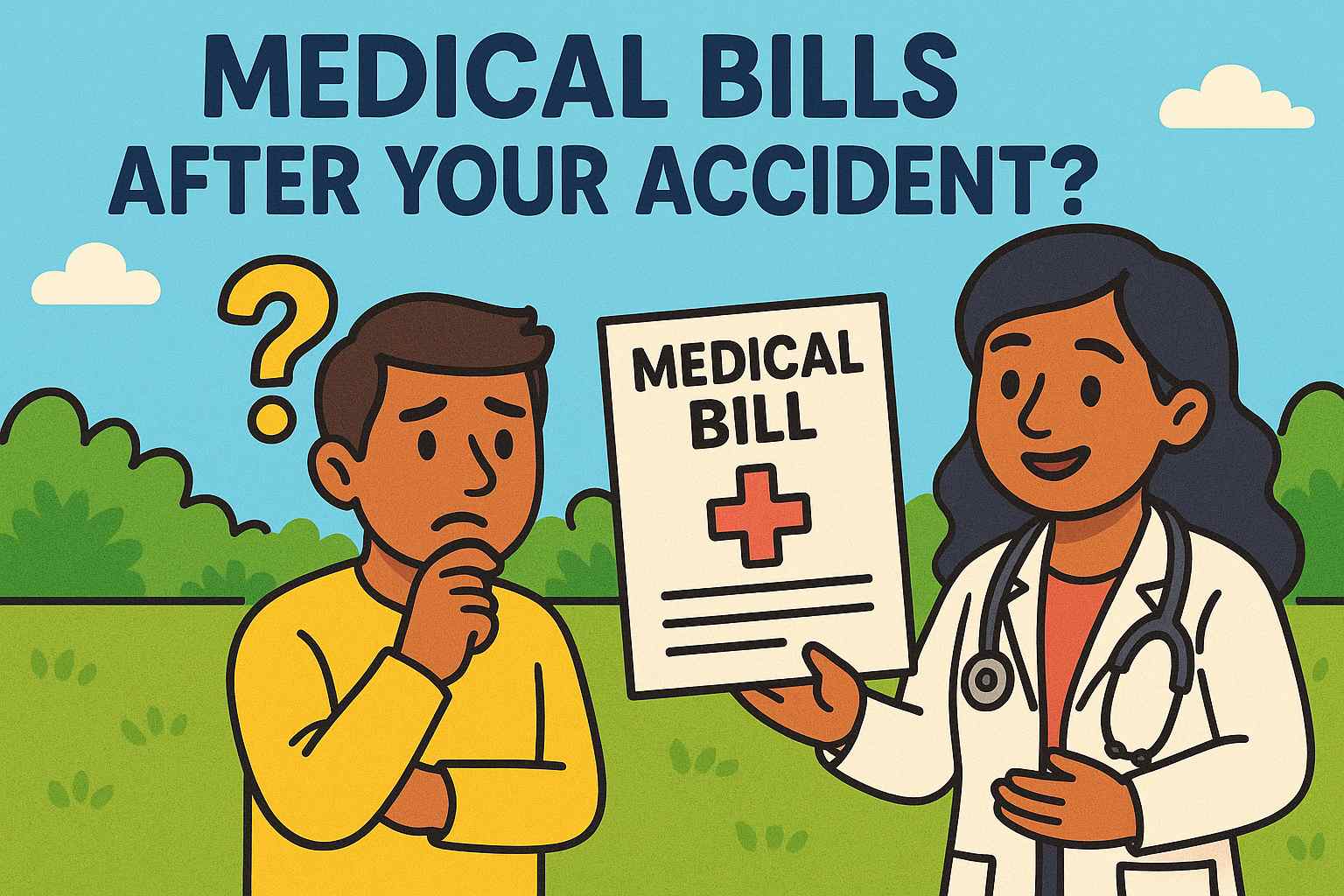Still Be Getting Medical Bills After Your Accident?

Medical Bills After Your Accident
After a car accident, you might expect that your medical bills will be taken care of right away—especially if the other driver was at fault. But many people are surprised when they continue to receive bills days, weeks, or even months after the crash. This can be frustrating and stressful, especially if you’re still in pain or missing work. You might start to wonder: Who’s supposed to pay these bills? And what happens if I can’t afford them?
If you’re receiving medical bills after your accident in California, you’re not alone. This is a common problem, and there are legal ways to protect yourself. In this blog post, we explain why this happens, what your options are, and how hiring a lawyer can make a big difference in handling your medical expenses.
California Is a “Fault” State — But That Doesn’t Mean the Other Driver Pays Right Away
In California, the driver who caused the accident is legally responsible for paying for damages, including your medical bills. But that payment usually comes much later. It doesn’t happen right after the crash. That’s because the insurance company must first investigate, then agree on fault, and only then negotiate a settlement.
Until that process is complete, you may still receive medical bills from hospitals, emergency rooms, specialists, physical therapists, or imaging centers. They expect to get paid whether your case is settled or not. Unfortunately, this puts accident victims in a tough spot: you’re hurt, you didn’t cause the accident, and yet you’re being asked to pay out of pocket.
This delay is especially hard for people in places like San Francisco, where healthcare costs are high and emergency room visits can run into the thousands. Even a short ambulance ride can cost hundreds of dollars. That’s why it’s important to understand your payment options and protect your credit while your legal case is pending.
Health Insurance May Help — But You Still Have to Pay Some Costs
If you have health insurance, it may help cover some or most of your medical expenses. But that doesn’t mean you’re off the hook completely. You could still be responsible for deductibles, copays, and other out-of-pocket costs. Also, your health insurance provider may later ask to be reimbursed once you receive a settlement. This is called a lien or subrogation claim.
For example, let’s say your insurance pays $15,000 for your accident-related care. If you later receive a settlement from the other driver’s insurance, your health insurance company may demand repayment of that $15,000. A lawyer can often negotiate that amount down, but many people don’t even know this is part of the process.
If you don’t have insurance, or your plan doesn’t cover everything, you may receive bills directly from each provider. They may even send your account to collections. This can affect your credit and add to your stress. In these cases, a personal injury lawyer can help by contacting providers, delaying collection efforts, or helping you get treatment on a lien basis — where payment is postponed until your case settles.
What If the Other Driver Didn’t Have Insurance?
Unfortunately, many drivers in California are uninsured or underinsured. If the person who hit you doesn’t have enough coverage, you might be left with unpaid bills. That’s where your own auto insurance can step in — if you have uninsured/underinsured motorist (UM/UIM) coverage.
UM/UIM coverage can help pay for your medical costs if the other driver has no insurance or not enough to cover your losses. But even your own insurance company may push back or offer less than you deserve. That’s why working with a lawyer is so important. A skilled attorney can help file your UM/UIM claim, negotiate with your insurer, and make sure you’re getting full compensation under your policy.
This is especially important if your accident happened in San Francisco, where busy roads and limited parking mean higher chances of hit-and-runs or uninsured drivers. If you were injured by a driver who fled the scene or had no coverage, read our related post on what to do after a hit-and-run in California.
You Might Receive a Settlement — But It Can Take Time
If you have a personal injury claim, your lawyer will work to reach a fair settlement with the at-fault driver’s insurance company. But this process takes time. Insurance companies may ask for medical records, review fault, and argue about the value of your injuries. Meanwhile, the bills continue to arrive.
That’s why it’s important to talk to a lawyer early. Your attorney can work with your medical providers to delay billing, prevent your bills from going to collections, or find doctors who will treat you under a medical lien. This means they agree to wait for payment until your case is resolved.
Once the settlement is reached, your lawyer will also help make sure that any outstanding medical bills, health insurance liens, or other costs are properly paid out of the settlement. That way, you don’t end up surprised by new bills after your case is over.
What If I Already Paid Some of My Medical Bills?
If you paid some of your medical bills out of pocket after your accident, you might be able to get reimbursed as part of your settlement. Keep all receipts, invoices, and proof of payment. This includes copays, prescriptions, physical therapy, and even mileage to medical appointments.
In your injury claim, these expenses can be added as “economic damages.” A lawyer can help collect and organize this information so you receive full compensation for everything you’ve spent. If you don’t have a lawyer, the insurance company may not offer reimbursement unless you specifically ask for it — and even then, they may challenge the amount.
This is especially important in California, where medical care is expensive and missing out on even a few hundred dollars can make a difference. In cities like San Francisco, where people rely on public transit or have limited access to affordable care, every dollar counts.
Should I Keep Going to the Doctor If I Can’t Afford It?
Typically, you should continue getting medical treatment if you’re still in pain. Gaps in treatment can hurt your health — and your case. Insurance companies may argue that if you didn’t go to the doctor, then you must not have been injured. That’s why continuing care is important, even if the bills are piling up.
If you’re worried about paying for care, talk to a lawyer. They may be able to connect you with doctors who will wait for payment or help you get care on a lien. They can also explain which types of treatment are most important for documenting your injuries. This can make a big difference in the value of your case and your long-term recovery.
Also, if you’re dealing with anxiety, depression, or trouble sleeping after the crash, don’t ignore it. Emotional trauma is a real part of injury cases. If you’re unsure whether you can get help for this, read our blog on seeking compensation for emotional distress after a car accident.
How a Lawyer Can Help With Medical Bills After Your Accident
Dealing with medical bills after your accident can be overwhelming. But you don’t have to handle it alone. A personal injury lawyer can help in several ways. They can:
- Communicate with medical providers to delay or reduce billing
- Help you get treatment on a lien so you can continue care
- Handle health insurance reimbursement demands
- Include all medical costs and out-of-pocket expenses in your claim
- Push the insurance company to settle for a fair amount
- Protect your credit while your case is pending
In California, most personal injury lawyers work on a contingency basis. That means you don’t pay anything unless they win your case. This allows you to get the help you need without worrying about upfront costs.
If you were injured in a crash in San Francisco or anywhere in California, don’t wait for the bills to pile up. The sooner you talk to a lawyer, the more options you may have to protect your finances and your health.









